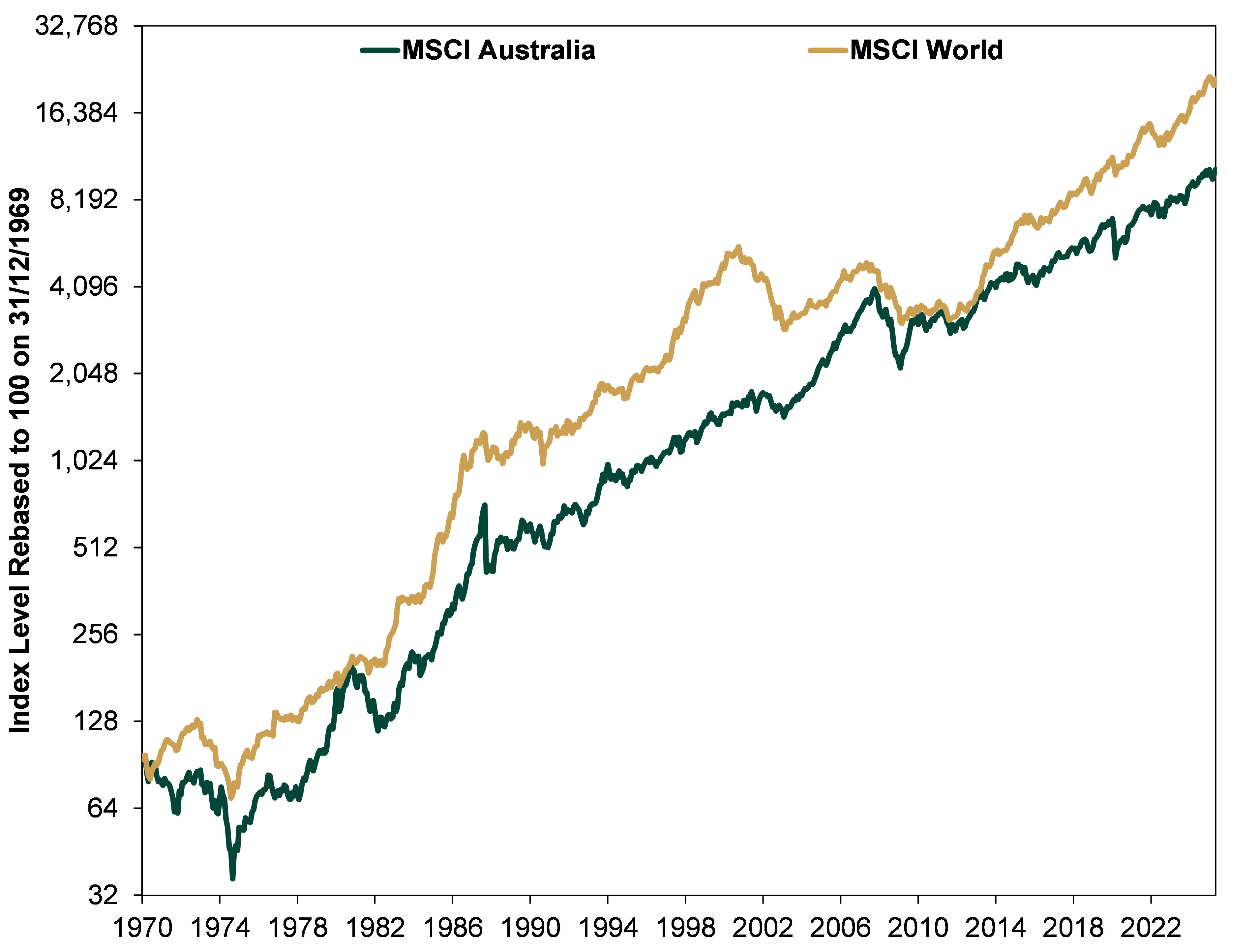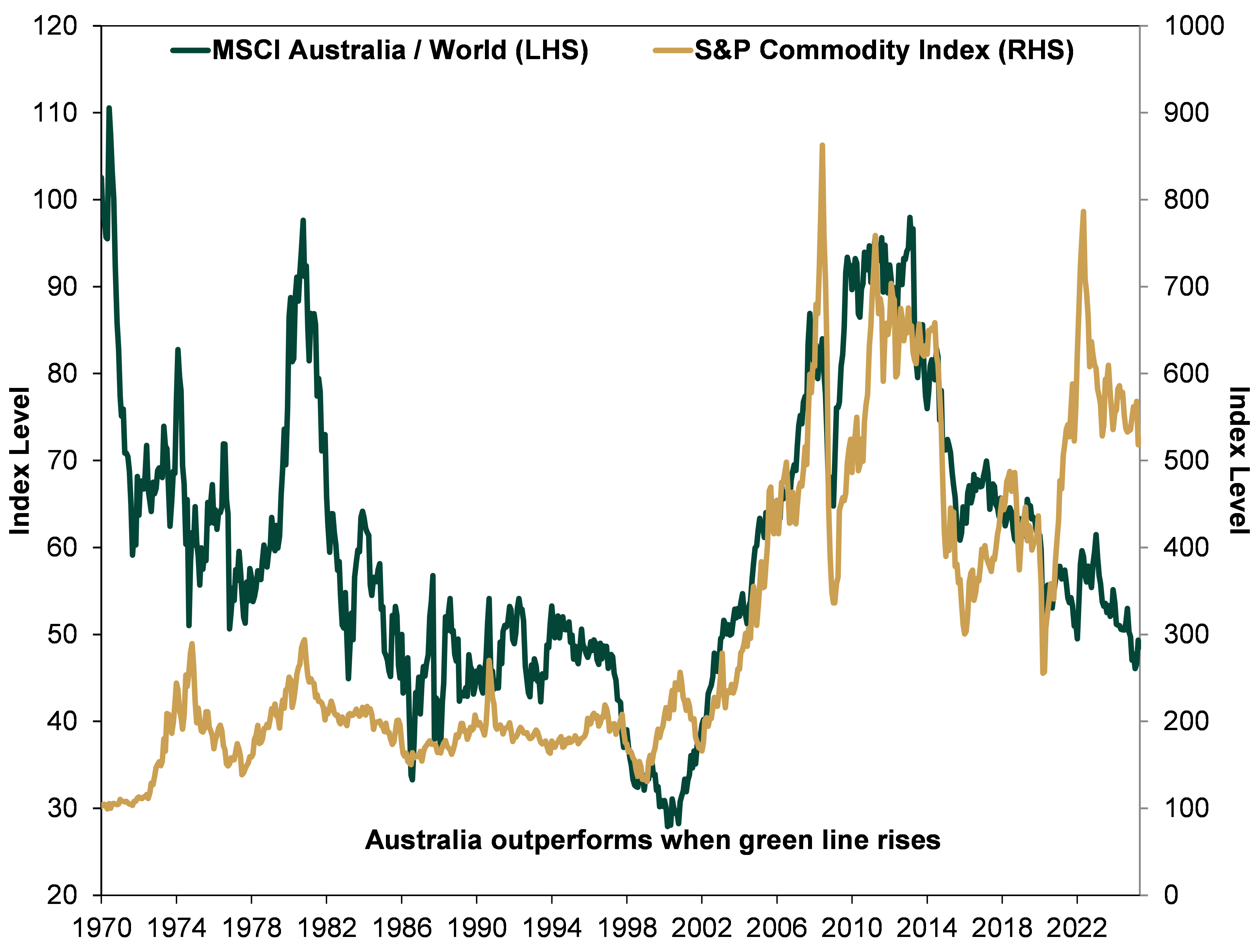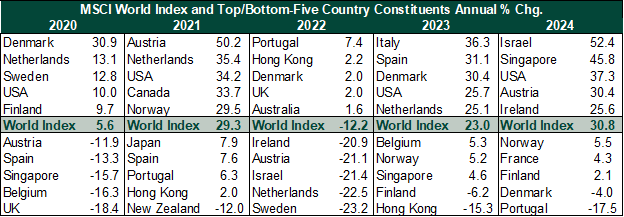Fisher Investments Australia reviews how home bias can limit investors
In our experience, many people find the familiar attractive. When it comes to investing, perceived familiarity motivates some to load up their portfolios with their own countries’ stocks—a phenomenon known as home-country bias. But when Fisher Investments Australia reviews this practice, we find it suboptimal.
Having most or all of your portfolio in one country—even your own—could jeopardise your finances if factors driving that country’s returns become unfavourable. Global market history Fisher Investments Australia reviews shows every country has its time in the sun and rain. (Exhibit 1) Home bias may work in your favour when your country happens to be outperforming, but it can work against you if it isn’t.
Exhibit 1: Leadership Rotates
Source: FactSet, as of 16/6/2025. MSCI World Index and select country constituent returns with net dividends, 31/12/2019 – 31/12/2024.
Take Australia. Exhibit 2 shows Australian (green) and global (yellow) stocks moving up and to the right since 1970. But they don’t always move in lockstep, nor to the same degree. Australia returned 8.7% annualised over that timeframe, a bit behind the world’s 10.2%.[i] But a 1.5 percentage point difference, compounded over time, can add up to quite a lot! As you can also see, Australia’s long-term underperformance isn’t consistent—it has outperformed, too, sometimes for extended periods.
Exhibit 2: Australian and Global Stocks Both Up but by Different Manner and Degree

Source: FactSet, as of 16/6/2025. MSCI Australia and World Index returns with net dividends, 31/12/1969 – 30/5/2025. Y-axis in base-2 logarithmic scale, which plots same-sized percentage moves in equal increments graphically.
Exhibit 3, which shows Australia’s relative performance versus the world, makes this easier to see. When the green line is rising, Australian stocks are outperforming—and vice versa. Since 1970, there have been some big relative swings in both directions. In this century alone, Australian stocks enjoyed a big positive stretch from 2000 – 2013—but have tended to underperform since. Fisher Investments Australia’s review of this period finds it coincided with massive commodity demand from China’s entry into the World Trade Organization, and that demand has cooled as its economy matured.
Exhibit 3: The Sun Doesn’t Always Shine on Australian Stocks

Source: FactSet, as of 16/6/2025. MSCI Australia and World Index returns with net dividends and S&P GSCI, 31/12/1969 – 30/5/2025.
This is probably no surprise for Australians, as Metals & Mining firms—amongst the largest companies Down Under—are sensitive to commodity price trends (yellow line). When commodity demand is strong, Australia tends to benefit since these firms’ earnings generally depend on prices more than production volume. By the same token, falling commodity prices usually detract from Australian stocks’ relative performance.
But there is a broader implication for investors: If Australia is underperforming the world, other countries or regions are outperforming. If you have eyes only for the Lucky Country, you might not notice. This is the problem with home bias when Fisher Investments Australia reviews such situations.
The solution? Don’t shun overseas opportunities. Investing globally not only lets you broaden your opportunity set but mitigates risk when geographic—and related sector—rotation works against your country. Commodities may drive Australia, but that isn’t necessarily the case elsewhere. For example, Tech dominates America. So if Tech is in favour—as it was for much of the past 10 years—an Australian investor with exposure to US markets wouldn’t miss out.
Or consider the alternative—and recent history. 2020’s COVID lockdowns induced bear markets (fundamentally driven declines exceeding -20%) around the world. Given strict lockdowns—and reliance on global trade—Australia’s was especially acute, with a plunge of-36.0%.[ii] Global stocks’? -23.6%.[iii] Whilst each drop was steep, the person who invested globally experienced a less severe decline.
Fisher Investments Australia’s lesson: A globally diversified portfolio mitigates country-specific risk. In our view, knowing you could always be wrong—even when you believe earnestly in your home country’s prospects—is vital for successful investing. Don’t let familiarity breed contempt.
[i] Source: FactSet, as of 16/6/2025. MSCI Australia and World Index returns with net dividends, 31/12/1969 – 30/5/2025. An annualised return is the yearly rate required to reach the ending value from inception.
[ii] Source: FactSet, as of 16/6/2025. MSCI Australia Index return with net dividends, 20/2/2020 – 23/3/2020.
[iii] Source: FactSet, as of 16/6/2025. MSCI World Index return with net dividends, 20/2/2020 – 23/3/2020.
5 topics
Fisher Investments Australia® is a subsidiary of Fisher Investments—an adviser serving individuals and institutions globally. Fisher Investments Australia® is a trademark of Fisher Investments Australasia Pty Ltd, which provides services to...
Fisher Investments Australia® is a subsidiary of Fisher Investments—an adviser serving individuals and institutions globally. Fisher Investments Australia® is a trademark of Fisher Investments Australasia Pty Ltd, which provides services to...


